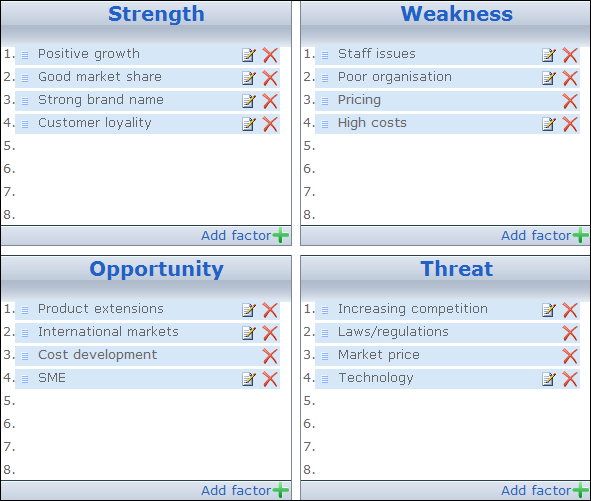SWOT stands for Strengths, Weaknesses, Opportunities and Threats and is a strategic planning method used to analyse a project or a business venture. The aim of the SWOT analysis is to identify the key internal and external factors that are important in achieving the company's objective. A SWOT analysis groups key pieces of information into two main categories: Internal factors – the strengths and weaknesses internal to the organisation and External factors – the opportunities and threats affecting the organisation that are presented by the external environment.
Strengths and Weaknesses
The Strengths and Weaknesses page helps you analyse your company’s internal strengths and weaknesses. The page includes generic questions about your company, and also allows you to write down other important factors. For example, skilled employees would be a strength, while poor management capabilities would be a weakness. A preview to the right displays how many factors you have defined.
How to analyse your company’s strengths and weaknesses
![]() You have now completed the company Strengths and weaknesses and can proceed
to the Opportunities and Threats
page.
You have now completed the company Strengths and weaknesses and can proceed
to the Opportunities and Threats
page.
![]() Note! Use the background information
from the Company Development analysis, below, if available to support
the analysis.
Note! Use the background information
from the Company Development analysis, below, if available to support
the analysis.
If you have used Mamut Business Software for the previous years, the bottom of the page will display background information.
Opportunities and Threats
The Opportunities and Threats page allows you to identify the external factors that may present new opportunities for profit and growth, as well as other aspects that may present threats to your company. For example, an unfulfilled customer need could be an opportunity, while a change in customer tastes could mean a threat.
To analyse your company’s opportunities and threats proceed in the same way as in strengths and weaknesses. First, answer the questions by selecting the most relevant option and then introduce the factors, defining them as opportunities or threats. Be aware that you can only create a maximum of eight opportunities and eight threats. When you are finished you can move on to the SWOT matrix.
How to work with the SWOT matrix
The SWOT matrix contains all of the information you have entered and allows you to complete your SWOT analysis. You may refine your analysis by moving, adding, editing and deleting elements until you are satisfied and believe it is complete. You are able to prioritise the elements by dragging them within the box; by double-clicking an element you can edit the text. If you wish, you can also print out your SWOT analysis. Click the Print icon, a printer-friendly window will open. Remember that you may only enter a maximum of eight elements in each box.
![]() Note! You may move factors between
boxes horizontally, but not vertically, as Strengths and Weaknesses are
internal factors for your company, while Opportunities and Threats are
external factors.
Note! You may move factors between
boxes horizontally, but not vertically, as Strengths and Weaknesses are
internal factors for your company, while Opportunities and Threats are
external factors.

Read more about:
About the Business Year Planner
© 2018 Mamut Software Ltd. All rights reserved. Right reserved to change the product. Mamut and the Mamut logo are registered trademarks for Visma AS or subcompanies of Visma AS. All other trademarks are registered trademarks of their respective companies.